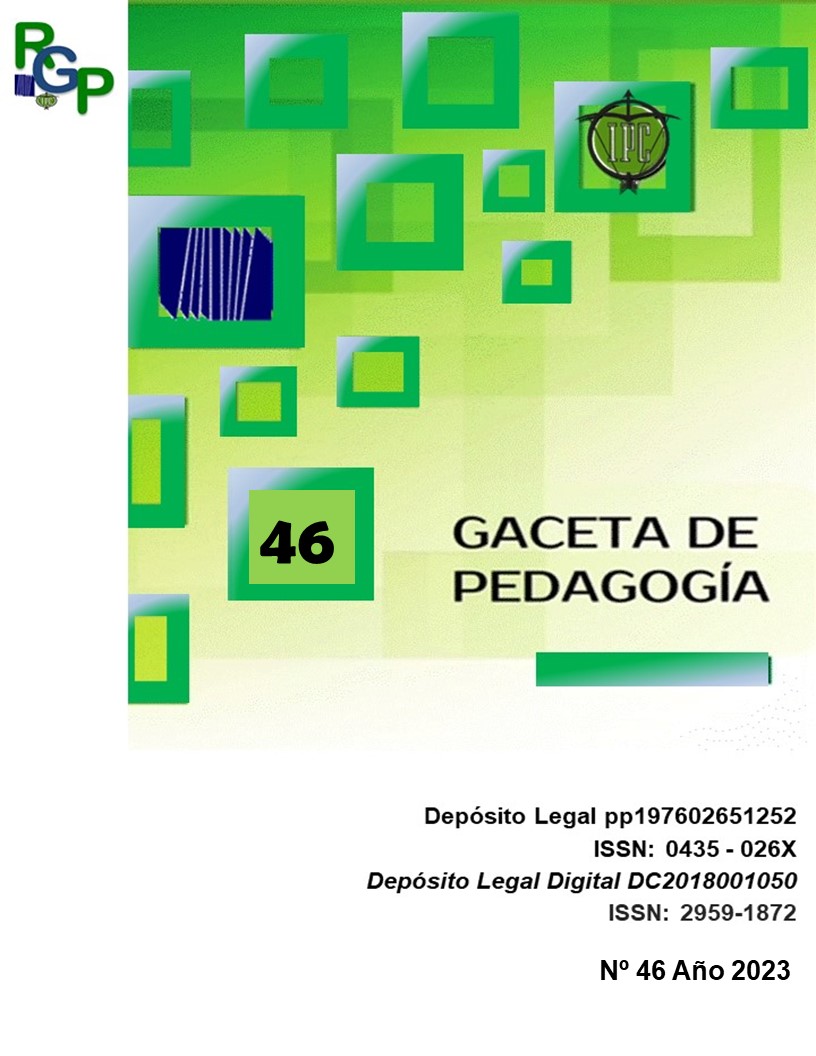Incidence of teacher well-being in educational quality
DOI:
https://doi.org/10.56219/rgp.vi46.2078Keywords:
Teacher well-being, Educational qualityAbstract
To talk about educational quality in the context of education, it was necessary to understand the concept of teacher well-being since this factor has historically affected the educational system; For this reason, this article investigated theoretical elements that allowed us to understand this phenomenon, where the disposition and motivation of the teacher become determinants when it comes to improving the teaching processes. Methodologically, the documentary design was used with 19 units of analysis, which helped to establish that teachers are physically, emotionally and mentally affected by contingencies typical of their work and personal environment, which, when incorrectly assumed, limited their performance. professional; It can be concluded that as long as educational policies and work environments do not favor the well-being of teachers, the quality of education will be limited to measuring non-humanizing standards of the school.
References
Acuña, F. (2015). Incentivos al trabajo profesional docente y su relación con las políticas de evaluación e incentivo económico individual. Estud. pedagóg. [online]., vol.41(n,1), 7-26. https://acortar.link/egla8V
Arias, F. (2012). El Proyecto de Investigación (6 ed.). Caracas: Editorial Episteme.
Ascorra, P., y Lopez, V. (2014). Relación entre el bienestar social de Profesores y el Nivel de Autonomía y Tamaño de Escuelas Municipalizadas Chilena. Terapia psicológica, 32(n.2). http://dx.doi.org/10.4067/S0718-48082014000200005
Bodero, H. (2014). El impacto de la calidad educativa. Apuntes de Ciencia & Sociedad. Vol.4, Nº 1. pp 112-117. https://dialnet.unirioja.es/servlet/articulo?codigo=5042937
Bonet, C. (2021). Bienestar docente: Intervención en liderazgo en profesorado de educación secundaria. Tesis de Grado. Universitat Jaume I, Madrid.
Borjas, M., y Gomez, I. (2019). Bienestar docente y competencias de la profesión de la docencia. Revista de Ciencias Humanas y Sociales, Nº. 89, 2, pp 1023-1051 https://dialnet.unirioja.es/servlet/articulo?codigo=8188285
Chehaybar, E. (2007). Reflexiones sobre el papel del docente en la calidad educativa. Reencuentro(50), 100-106. https://www.redalyc.org/pdf/340/34005013.pdf
Cornejo, R. y Quiñónez, M. (2007). Factores Asociados al Malestar/Bienestar Docente. Una Discusión desde la Investigación Actual. REICE. Revista Electrónica Iberoamericana sobre Calidad, Eficacia y Cambio en Educación, 5(5), 75-80. https://www.redalyc.org/pdf/551/55121025011.pdf
Cornejo, R. (2009). Condiciones de trabajo y bienestar/malestar docente en profesores de enseñanza media de Santiago de Chile. Educ. Soc., Campinas, 30(107), 409-426. https://www.scielo.br/j/es/a/V73rpVdRj5NmN6Mtb9WxP3n/?format=pdf&lang=es
Covey, S. (2014). Los 7 Hábitos de la Gente Altamente Efectiva. Barcelona: Paidós.
De Pablos, J., y Colás, P. (2011). Bienestar docente e innovación con tecnologías de la información y la comunicación. Revista de Investigación Educativa, 29(1), 59-81. https://revistas.um.es/rie/article/view/100131
Duarte, T., y Jiménez, R. (2007). Aproximación a la teoría del bienestar. (U. T. Pereira, Ed.) Scientia Et Technica, Vol. XIII, Nº 37, pp 305-310. https://www.redalyc.org/pdf/849/84903752.pdf
García, F., y Juárez, S. (2018). Gestión escolar y calidad educativa. Revista Cubana Educación Superior, vol.37, n.2, pp.206-216. https://acortar.link/HnAsJd
Hué, C. (2009). Razones para el bienestar docente. Revista de la Facultad de Ciencias de la Educación, Nº 390, pp 88-91. https://redined.educacion.gob.es/xmlui/handle/11162/37002
Huertas, J., y Dávila, J. (2020). Claves contextuales y psicológicas del bienestar docente. Cuadernos de pedagogía (Nº 507), pp. 73-76. https://redined.educacion.gob.es/xmlui/handle/11162/207188
Martínez, G. (2016). El desempeño docente y la calidad educativa. RA XIMHAI: revista científica de sociedad, cultura y desarrollo sostenible, 12(6), 123-134. https://dialnet.unirioja.es/servlet/articulo?codigo=7933112
Maslach, C., y Pines, A. (1977). The Burnout syndrome in day care setting. California - USA.
Maslow, A. (2016). El hombre autorrealizado: hacia una psicología del Ser. Editorial Kairós.
Max-Neef, M.; Elizalde, A. y Hopenhayn, M. (1994). Desarrollo a Escala Humana. (CEPAUR, Ed.) Santiago, Chile: El Centro de Alternativas de Desarrollo. https://www.daghammarskjold.se/wp-content/uploads/1986/08/86_especial.pdf
Ministerio de Educación Nacional de Colombia. MEN (2018). La calidad: esencia de la educación en las aulas de clase. Ministerio de educación Nacional: https://www.mineducacion.gov.co/portal/salaprensa/Noticias/373629:La-calidad-esencia-de-la-educacion-en-las-aulas-de-clase
Plá, S. (2013). Calidad educativa. Historia de una política para la desigualdad. México, México: LIBRUNAM. https://acortar.link/FWPuhr
Ramos, J. (2008). Reformas, investigación, innovación y calidad educativa. Revista Iberoamericana de Educación, 46(2), 1-12. https://rieoei.org/RIE/article/view/2002/3018
Ribes, R., Lumbierres, C., Boix, J.-L., Cano, S., De Andres, C., Jové, G., Suau, J. (2008). Estudio sobre indicadores de bienestar docente en profesorado de Secundaria. Cultura y Educación, 20(3). pp 347-356 https://www.tandfonline.com/doi/abs/10.1174/113564008785826376
Ríos, H., y Sajoa, J. (2019). Relación entre el bienestar docente y los sistemas de gestión de calidad. Tesis de Maestría. Universidad de la Costa, Barraquilla. https://acortar.link/xIIOzF
Rodríguez, W. (2010). El concepto de calidad educativa: una mirada crítica desde el enfoque históricocultural. Revista Electrónica "Actualidades, 10(1), 1-28. https://www.redalyc.org/pdf/447/44713068015.pdf
Seibold, J. (2000). La calidad integral en educación : reflexiones sobre un nuevo concepto de calidad educativa que integre valores y equidad educativa. Revista Ibero Americana(23) pp. 215-231. https://rieoei.org/historico/documentos/rie23a07.htm
Vidal, M., y Morales, I. (2010). Calidad Educativa. Educación Médica Superior, 24(2). pp 253–274 http://scielo.sld.cu/scielo.php?script=sci_arttext&pid=S0864-21412010000200013
Published
How to Cite
Issue
Section
License

This work is licensed under a Creative Commons Attribution-NonCommercial-NoDerivatives 4.0 International License.

